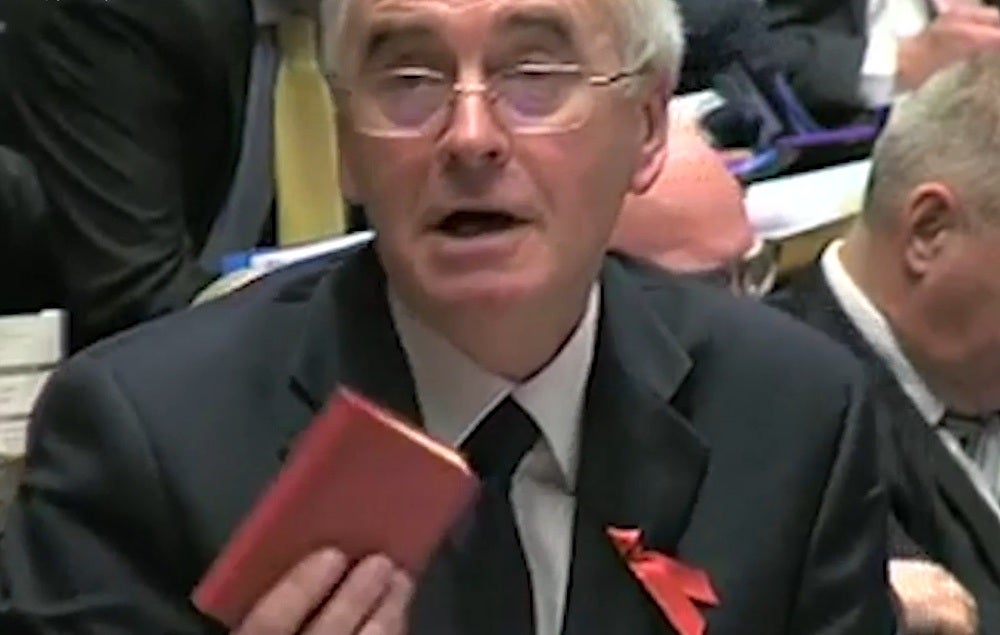Autumn Statement: You cannot joke about Mao's Little Red Book, Mr McDonnell
Too many lives were destroyed on its account


Your support helps us to tell the story
From reproductive rights to climate change to Big Tech, The Independent is on the ground when the story is developing. Whether it's investigating the financials of Elon Musk's pro-Trump PAC or producing our latest documentary, 'The A Word', which shines a light on the American women fighting for reproductive rights, we know how important it is to parse out the facts from the messaging.
At such a critical moment in US history, we need reporters on the ground. Your donation allows us to keep sending journalists to speak to both sides of the story.
The Independent is trusted by Americans across the entire political spectrum. And unlike many other quality news outlets, we choose not to lock Americans out of our reporting and analysis with paywalls. We believe quality journalism should be available to everyone, paid for by those who can afford it.
Your support makes all the difference.The broad grin on John McDonnell’s face suggests he was trying to make a joke, and certainly George Osborne’s increasing dependence on the Chinese People’s Republic command economy has its funny side. But you can’t make a joke about Mao’s Little Red Book: too many died, too many innocent lives were destroyed on its account, for it to be resurrected in fun.
Mr McDonnell waved it, and indeed this book was made to be waved: during China’s disastrous Cultural Revolution, thousands of Red Guards in identical indigo blue Mao jackets waved it as they chanted its dictates and rounded up unfortunate “class traitors” for “re-education sessions”.
Originally published in 1964 as 200 Quotations from Mao Tse-tung, it became the required text of Mao’s gospel of continuous revolution: a tidy if tiresomely doctrinaire synthesis of the principles that propelled Mao and the Chinese Communist Party to victory over the Kuomintang, then to the unification of the country under the tight control of the party. Printed and distributed in the millions across China, it was to be the constant companion of all good party members, instructing them how to deal with uneducated peasants, landlords and other class enemies, as well as dissidents within the party. “Poisonous weeds [should be] fought wherever they crop up,” it exhorted. And to those confused about the party’s aims, “The seizure of power by armed force…is the central task and the highest form of revolution.”
The book was the codification of the ideas, derived mostly from Marx and Lenin, which Mao believed would enable his country to recover from its “century of shame” at the hands of the imperialists and stand strong in the world again. It also had deep roots in China’s home-grown authoritarian traditions – but Mao, as a lifelong revolutionary set about smashing, over and over again, the Confucian principles of hierarchy and order on which Chinese civilisation had been based for millennia.
The ruthlessness of the project leaps out of the Little Red Book’s pages: “Our state is a people’s democratic dictatorship,” Mao declares. “Its first function is to suppress the reactionary classes…to arrest, try and sentence certain counter-revolutionaries, and to deprive landlords and bureaucrat-capitalists of their right to vote and their freedom of speech…
“The people’s democratic dictatorship…does not let [the enemy] take part in political activities and compels them to obey the law of the People’s government and to engage in labour, and through labour, transform themselves into new men...”
The bitter irony is that it took precisely a counter-revolution of the sort that Mao warns against to haul China back from the brink of ungovernable chaos to which the “continuous revolution” dogma had brought it: without Deng Xiao-ping’s return to power and the prosecution, after Mao’s death, of his widow and the other members of the notorious “Gang of Four”, the People’s Republic might have found itself speeding up the same blind alley as the Democratic People’s Republic of Korea next door.
It is doubtful whether Mr McDonnell’s gambit will do his party much good in the immediate future. But if he is a true believer, that won’t worry him: Mao has consoling words. “The socialist system,” he promised, “will eventually replace the capitalist system; this is an objective law, independent of man’s will…sooner or later revolution will take place and will inevitably triumph.”
Join our commenting forum
Join thought-provoking conversations, follow other Independent readers and see their replies
Comments